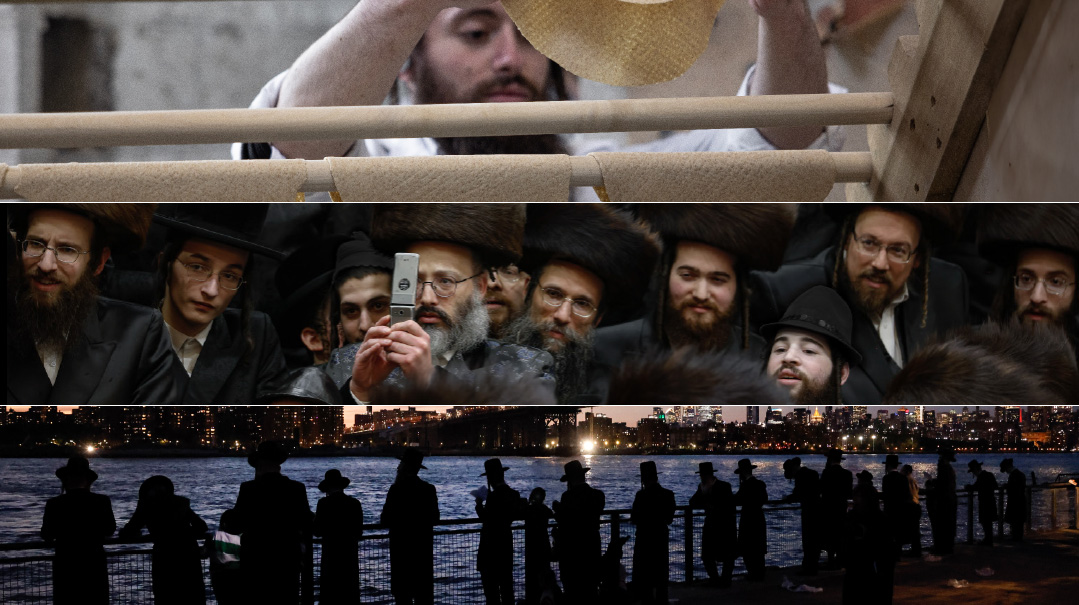The A-B-D Shidduch Guide for the Perplexed


Lag B’omer is here and that means a fresh crop of bochurim has returned from Eretz Yisrael, and the next class of seminary graduates is due to deplane in a few short weeks. Newbie parents and their unsuspecting children are about to be thrust into the cavernous throes of (cue scary music) “The Parshah.”
Words previously known to them will heretofore be referred to in entirely different contexts (e.g. “parshah”). Snoods will no longer be acceptable walking attire. Confusion may temporarily reign as the rest of the family’s needs are brushed aside.
As a public service, Mishpacha has asked me to ease the way and provide these families with a kinder, gentler transition into this new world. To that end, I’ve prepared a compilation of useful terms, with the occasional unsolicited tidbit of advice thrown in, because after all, I’m an advice columnist. Apologies to the chassidishe oilam and to our readership outside of North America; the material here may resonate more deeply with the American Yeshivish crowd.
Disclaimer: All information contained in this feature is purely opinion (mine). No facts were harmed in the creation of this product.
A: Anonymous
Don’t be.
Don’t be that guy (or gal) who calls and asks deeply personal, sometimes highly intrusive, questions about a dear friend or neighbor without revealing your identity. While you may see it as clever, it’s actually just rude. If you’re asking a question you don’t want associated with you, perhaps you shouldn’t be asking it. And if you do choose to stay anonymous, expect the same level of candor in return from your respondents.
B: Bashert
The idea that whatever happens comes from Hashem and is for the good.
In this context, defined as “the person you’re destined to marry,” commonly referred to as “your bashert.” Much ink has been spilled, and even more breath has been breathed, on whether one can have more than one “bashert,” whether one can pass up his/her “bashert” by being too picky, and if having a bad hair day can “shter” something, if it’s really bashert.
Many DMCs on late seminary nights have been held on the elusive inconclusive bashert/hishtadlus balance. (see Hishtadlus below)
D: Dave and Buster’s
Loud, overstimulating venue often chosen for a second or third date with no dating value other than ascertaining how your date responds in loud, overstimulating situations. Which, considering he or she might be the parent of your future kids, might actually be good to know.
D: Discretion
The better part of valor. Everyone loves a good date story, but maintain your date’s dignity. Ultimately it will be your own dignity that’s saved when you’re discreet and respectful.
D: DOA (Dead on Arrival)
Sad but true. Sometimes it will become apparent, upon opening the door, that this match isn’t one. That’s okay. It happens. Be a mensch anyway. (see M below)
F: Ferragamo belt
Did he borrow it? Is it his? If it is — is it real? Faux? Authentic faux? Did he buy it at Nordstrom, an outlet, or Last Chance?
The answers to these questions and more reveal so much about values, impressions, lifestyle choices, etc. Double significance if the shoes are also Ferragamo.
F: Fun
(adj.) as in “She’s so fun!”
- a) Easy to be around, laughs easily, and enjoys life.
- b) Flighty, irresponsible, more than that I really don’t want to tell you, but I’d feel guilty if I don’t mention anything. Please read between the lines.
Could be either. Context matters. Do your homework.
H: Hishtadlus
Human effort as expected by Hashem, which may or may not be the channel through which brachah is received. May include, but isn’t limited to, meeting shadchanim, networking, looking decent at all times, getting hair extensions, stopping Rabbi Tzadok Katz on Clifton Ave and thrusting the picture of your niece (your current phone wallpaper) in his face, going to Pesach programs with nationally acclaimed shadchanim, following up with courteous emails. This list is by no means exhaustive, and the omission of any efforts in no way indicates that they aren’t hishtadlus worthy. There’s much debate over whether paying just to meet a shadchan is hishtadlus or another noun.
Often used interchangeably or confused with segulos.
M: Middos/Menschlichkeit
- a) Find out if the person being redt has any.
- b) Don’t leave people hanging. Get back to people in a timely fashion after receiving a r?sum?. Remember there’s a person behind that sheet of paper. If there’s a reason you need extra time, let the shadchan know. Communication is everything. Try to get back to the shadchan by the next morning. If you have to mull it over, let them know.
Remember your P’s and Q’s. Say thank you when someone thinks of you. If someone sets you up, send a gift or a check — even if the shidduch didn’t work out.
M: Mini-golf
When you’ve overdone the tachlis thing (see below) and “just need to see if you can have fun together and enjoy each other’s company.”
L: Leftover Rugelach
For those of you who panic at the mere mention of homebaked goods, relax. There’s bad news and good news. The bad news is that you will, in fact, have to bake rugelach. Not because the boy will know the difference, but because his mother might ask. They will be artfully arranged on a silver platter (yes, you do need to polish it, at least for the first date.) The good news is that you’ll only have to bake once. And then seal it in shellac.
No one actually eats the rugelach, but everyone has to put it out. As soon as the couple leaves, you can return the goodies to the freezer to be pulled out the next time they’re needed.
N: Not
Everything the girl in question is. Not too quiet, not too loud, not the life of the party, but not shy. Tzniyus, but not in a farfrumt way. Smart, but not overly smart. Thin, but not too thin. Does a lot of chesed, but like not in a crazy way. Like she knows when to say no. Geshikt but not controlling.
O: Ocean Place
That mysterious blend of normative (everyone goes there) yet individual. Distracting enough for a first date that’s DOA (see above) but quiet enough for a seventh date when it’s time to talk tachlis (see below). The 40-minute ride from Lakewood is long enough to get comfortable with each other but not so long that you’ve used up the entire list of open-ended questions scrawled on the business card in your wallet. Best of all, it can be easily practiced in advance, making you look like that “tichtige” guy who doesn’t need the Garmin to get where he needs to go.
O: OOT
Acronym for out of town.
Catch-all category referring to someone from Monsey, South Africa, or anywhere in between. Used to distinguish such folks from those who live in-town (Brooklyn).
As an aside, one can be OOT even when they are in their own town if a Brooklynite is present.
O: Official
The phase of dating that marks the couple’s engagement. There is chilukei dai’os as to when this occurs:
- a) As soon as she calls her parents and he calls his parents
- b) When 12 people who have never met either the chassan or the kallah receive a WhatsApp text on their phone of a couple lifting a champagne glass mid-air, against a water background, she clutching cellophane wrapped roses and he looking proud. It’s unclear if the rose petals on the floor fell from the bunch she is holding or if they were strategically scattered to look casual, but they are an integral part of making it “official.”
- c) Add an offended aunt (“My own sister and I have to hear about it on WhatsApp from the neighbor down the block…”) and then l’chol hadayos it’s official.
- d) When the parents drink a l’chayim
P: The Parshah
Much to the confusion of newcomers, this has nothing to do with what will be leined in shul this week. Unless, of course, it’s parshas Chayei Sarah and you’re telling the Rivkah Imeinu joke. (Rivka to her father Lavan: I want to start dating.
Lavan: You’re much too young.
Rivka: But I’m in The Parshah
Hahaha)
The Parshah is loosely defined as the stage of life where one is dating for the purpose of marriage. For girls in mainstream yeshivah circles, this stage begins roughly at 19 (standard deviation +/- 1) and continues until “Bashert” turns up (see above). For boys this used to begin at about 23, but it might start as early as 21 (just ask him, he might be ready) and continue through until“Bashert” appears(see above).
Being in The Parshah starts off feeling very exciting and loses its luster shortly thereafter. Usually within a week.
P: Perfect Matches
The must-have game for every serious dater, taking you from that chit chatty third date to the “game-changer” fourth date. (Get it? GAME changer?) Keep it in your trunk every time your dating journey hits a plateau.
R: Reference
Rosh yeshivah, seminary principal, friend, family, employer etc. who is listed on r?sum? as a source of information about the shidduch at hand. Often divided into “family references” and “girl’s/ boy’s references” this category of folks has been identified as the ones who can tell you all you need to know about the intended and his/her family.
You may have heard of the staunch “no reference” rule wherein people unequivocally and vehemently announce that they never call references because, “What do you think the friends are gonna tell you?” Turns out, quite a bit. While it’s prudent and necessary to call people beyond the r?sum?, never underestimate the ability of friends to tell more than they should. When a guy tells you this bochur is a great friend and you ask him what kind of great friend, like the kind who would take you to the airport at 4 a.m. if you were stuck, and he inadvertently chokes as he sputters, “Oh no! He would NEEEVER (and the ‘never’ takes him three syllables to say) go at 4 a.m.,” he’s actually told you quite a bit. Even if he tells you how great of a listener and chiller the guy is. So I wouldn’t completely nix references. They’re also very useful at giving an overall vibe that you can then pursue in greater detail with people whose loyalties lie with you.
R: Resume
A one-page summary of a human being, including pertinent biographical information such as where they spent summer camp in 2004. These and other details relevant to their suitability as a marriage partner (especially for you) must fit on one sheet, PDF preferred, Word acceptable. (More unsolicited advice: Do not send as a Google drive doc that you need to invite them to open.) The r?sum? includes references (see above) about the singles as well as their family. Attached photo optional. If you’re a girl. If you’re a boy, for some reason no one thinks that’s necessary.
S: shadchan with lower case s
The individual who set you up on this date. the shadchan could be a neighbor, relative, coworker, teacher, friend, or person who dated them previously. This may be the shadchan’s first attempt or their 100th.
Sometimes aka “shaliach” (e.g. the 13-year-old brother who set his sister up with his counselor from Mogen Av — is he the shadchan or the shaliach? Hard to tell. Mostly relevant for shadchanus purposes.)
S: Shadchan with uppercase S
This individual is to be revered. She has established herself as a matchmaking guru. Often misunderstood, always hounded, she’s the person whose phone call you answer. Her success rate numbers in the dozens, maybe even hundreds, but her batting average is classified information.
S: Snapple
The go-to drink you bring along. Nothing says, “I’m so thoughtful” more than the perfectly poised peach Snapple in your cup holder.
S: Shir Hashirim
On the current Top 40 reading list of every mother with children in shidduchim.
T: Tachlis
Ambiguous, because the tachlis of the fourth date is not the tachlis of the eighth date. Both share the growing connection between the couple and a qualitative leap in the content of conversation. Whereas fourth date tachlis talk might refer to theoretical dreams, hopes, and aspirations, eighth date tachlis refers to actual dreams, hopes, and aspirations. And whether or not they include the person sitting across from you.
Tachlis can also refer to mechutanim conversations, including such loaded topics as location, venue, support, and whether or not a sushi buffet is considered minhag hamakom.
T: Tyrwhitt, Charles
(pronounced “Tirrit”)
Purveyor of elegant menswear, apparently with exclusive rights to BMG.
Shift seamlessly from second seder to date in your twill, spread collar, non-iron, stay crisp Charles Tyrwhitt shirt. Throw on the Ferragamo belt, slide your hand across your Borsalino brim, and you’re date ready.
V: Voss water bottle
See Leftover Rugelach above.
Except this one might actually get opened and poured. Because of course we always drink water that costs more per bottle than an entire case of water from Costco. That’s the sort of fineshmekkers we are.
W:Why
(the saddest letter)
Was it something I said? Did? Didn’t say? Wore? The whys are relentless when the painful “no” comes. Most likely you’ll get, “He/she felt it wasn’t for him/her,” and you get to stew on the “why” yourself. Most painful when you really thought this was It.
Y: Yichus
Kind of like “fargin”— there’s no accurate translation. So for lack of a better word, let’s use the term Jewish pedigree — the recorded ancestry, especially upper-class ancestry — of a person or family. Having yichus is highly sought in certain circles.
Y: Yes
He would like to meet her.
He would like to go out again.
She is ready to meet his parents.
Preferably In this order.
I hope you’ve found this primer to be helpful. This Parshah (you now know what that means) can be complicated and not for the fainthearted. Guidance is available. If you should require further assistance or clarification please contact us at matchquest@mishpacha.com.
(Originally featured in Family First, Issue 642)
Oops! We could not locate your form.











